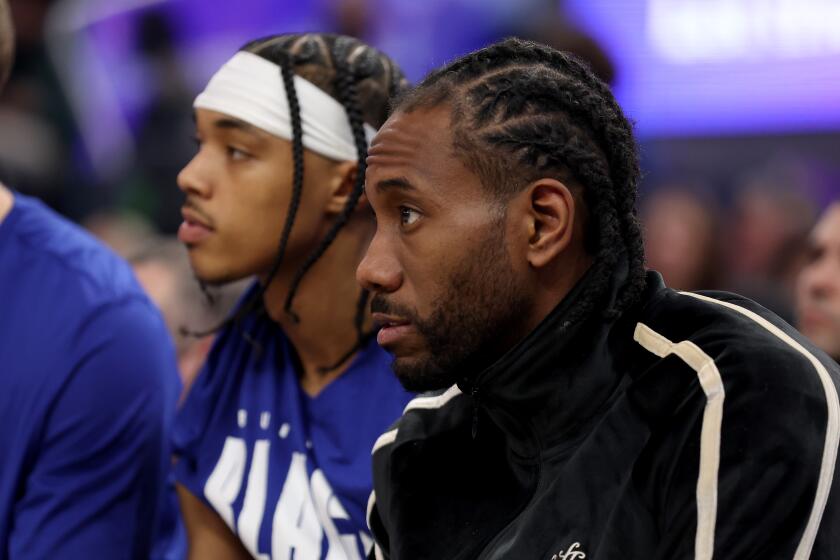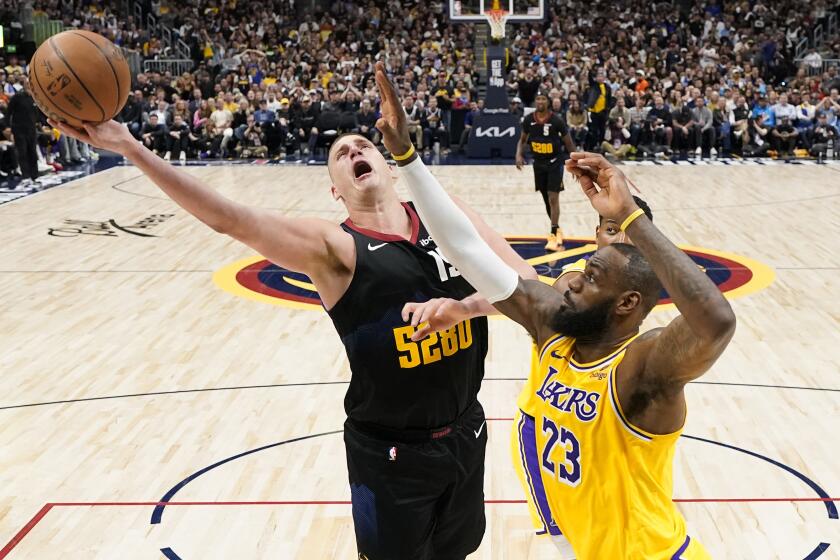This Could Be Fruitful for L.A.
He traded salary-cap entanglements for the twining of grapevines; squishing Cowboys for squashing Cabernets; the popping of champagne corks for the corking of his own bottles.
But now, less than a year after leaving football to tend a sprawling vineyard north of Napa, Carmen Policy is hoping to return to the NFL in an effort to put a team in Los Angeles. Policy helped build the San Francisco 49er dynasty before launching the expansion Cleveland Browns.
“Once you’ve been part of the NFL it’s hard to find something else to take its place,” Policy, 62, said in a recent interview. “So if there’s something I can do that works, that’s meaningful, that’s appreciated and that fits for everybody, that’s what I’d like to do.”
Policy said neither the league nor anyone in the Los Angeles political structure has approached him. But he thinks his experiences in San Francisco and Cleveland give him a unique perspective on the decade-long estrangement between the nation’s No. 1 sports league and its second-largest market.
“The NFL and Los Angeles have to abandon the way they’ve been dealing with each other up to now,” he said. “It’s got to be a marriage involving two highly talented, highly educated, highly motivated people.... You’re not talking about the farm girl meeting the big-city executive. You’re talking about equals learning to identify at eye level with each other and falling in love and somehow, some way making it better for both sides.”
Former San Francisco mayor Willie Brown thinks Policy would be a fit with Los Angeles.
“Los Angeles has lived for years with its identification with celebrities. Carmen would be a natural,” Brown said. “He would be smart enough to have prominent season tickets to the major teams, he would be on the red carpet for the Academy Awards ... he would be at the opening of the symphony. How do they say in Iraq with the reporters? He would become embedded in the community.”
The L.A. situation is somewhat comparable to Cleveland, where stadium construction began before a team owner was selected. Banking billionaire Al Lerner bought the franchise and hired Policy to build it.
The ride wasn’t smooth. With little time to get the franchise up and running -- Policy was refused an extra year to prepare -- the Browns kicked off in 1999 and were 2-14, followed by seasons with records of 3-13, 7-9, 9-7 and 5-11. They are now searching for their fourth coach, counting Terry Robiskie, who took over the team this season on an interim basis after Butch Davis resigned.
Lerner died of a brain tumor in October 2002, which set the stage for Policy’s resignation last April. The team is now headed by Randy Lerner, the late owner’s son.
“Without [Al] there, my interest in staying in Cleveland waned tremendously,” Policy said. “We always had a desire to get back to California anyway.”
Policy and his wife, Gail, split their time between their San Francisco apartment and their Yountville vineyard. Despite the appeal of such a life, Policy said things haven’t been the same for him since he left the NFL.
“I’ve got to find something to not only keep me active but keep me engaged in a competitive way,” he said.
He has been linked to software billionaire Larry Ellison, who has explored buying an NFL franchise to play in Southern California. Last year, Policy arranged a dinner meeting at Ellison’s home that included NFL Commissioner Paul Tagliabue and Roger Goodell, the league’s chief operating officer.
“I’ve known Larry since my days with the 49ers,” said Policy, who was San Francisco’s team president before joining Cleveland, where he held a minority ownership stake. “I did set up the dinner, but it’s something I’d do for any credible person in the same situation. I have no understanding, implied or expressed, with anyone. Nor has anyone promised me anything.”
That’s not to say Policy wouldn’t jump at the chance to be involved with an NFL franchise in L.A. He has met over the last few years with Casey Wasserman, owner of the L.A. Avengers arena league team, and said the two are not only on the same page “but on the same paragraph.” Wasserman, grandson of the late movie mogul Lew Wasserman, has expressed interest in buying an NFL franchise.
Ellison explored the possibility of buying the 49ers, but quickly learned that John York and his wife, Denise DeBartolo-York, were unwilling to sell.
Policy said he could be a “facilitator” in L.A., bringing together the NFL and the community. In the late 1990s, he used his powers of persuasion to win a $100-million bond from the city of San Francisco for a new stadium. That deal fell apart when then-owner Eddie DeBartolo handed the franchise over to his sister and Policy left for Cleveland.
“I think the franchise lost much of its attractiveness and potential for success and its incredible fan base when Carmen and Eddie DeBartolo left,” Brown said. “It was a major blow to our city.”
Policy, who grew up in Youngstown, Ohio, was raised by his grandmother after both parents died of heart failure. He worked his way through law school and became a successful trial attorney in Ohio. In 1983, he was hired as vice president and general counsel of the 49ers, who had been purchased five years earlier by 31-year-old DeBartolo, his boyhood friend and heir to a real-estate fortune.
Along with Hall of Fame coach Bill Walsh, the two helped turn the 49ers into an elite franchise.
“Carmen was heavily involved in the league processes when he became a full-time party to the 49ers,” Walsh said. “With his background and his courtroom savvy, he could bring owners together and people in the management element of the NFL together.... He makes people feel at ease and feel like they’re being treated fairly and honestly.”
Not everyone has harbored such warm feelings. In 1994, the first year the NFL put a limit on team payrolls, Policy outwitted rivals by restructuring more than a dozen contracts with large signing bonuses and low base salaries. With the money they saved, the 49ers went on a shopping spree, signing defensive standouts Deion Sanders, Richard Dent, Ken Norton, Rickey Jackson and Gary Plummer. The team rolled through the playoffs and pounded the San Diego Chargers in the Super Bowl.
There were allegations that he broke salary-cap rules in 1997. The infraction cost the 49ers two draft picks; under a settlement with the league, Policy paid a $400,000 fine and football operations director Dwight Clark paid $200,000.
Policy “has the ability to take a seemingly impossibly convoluted circumstance with angry, intemperate parties at each other’s throats
Crafting a solution for L.A. would be a daunting challenge. Unlike San Francisco and Cleveland, which are passionate about their football teams, there’s no great clamoring to bring a team back to Southern California. What started as an impasse is now a yawning chasm that dozens of influential people have failed to bridge.
“The only way I’ll get involved in anything that has to do with the NFL in California is if the league thinks it’s the right thing to do, and I can be a contributor,” Policy said.
“If that’s not the case, then I’ll grow my grapes.”
More to Read
Get our high school sports newsletter
Prep Rally is devoted to the SoCal high school sports experience, bringing you scores, stories and a behind-the-scenes look at what makes prep sports so popular.
You may occasionally receive promotional content from the Los Angeles Times.







